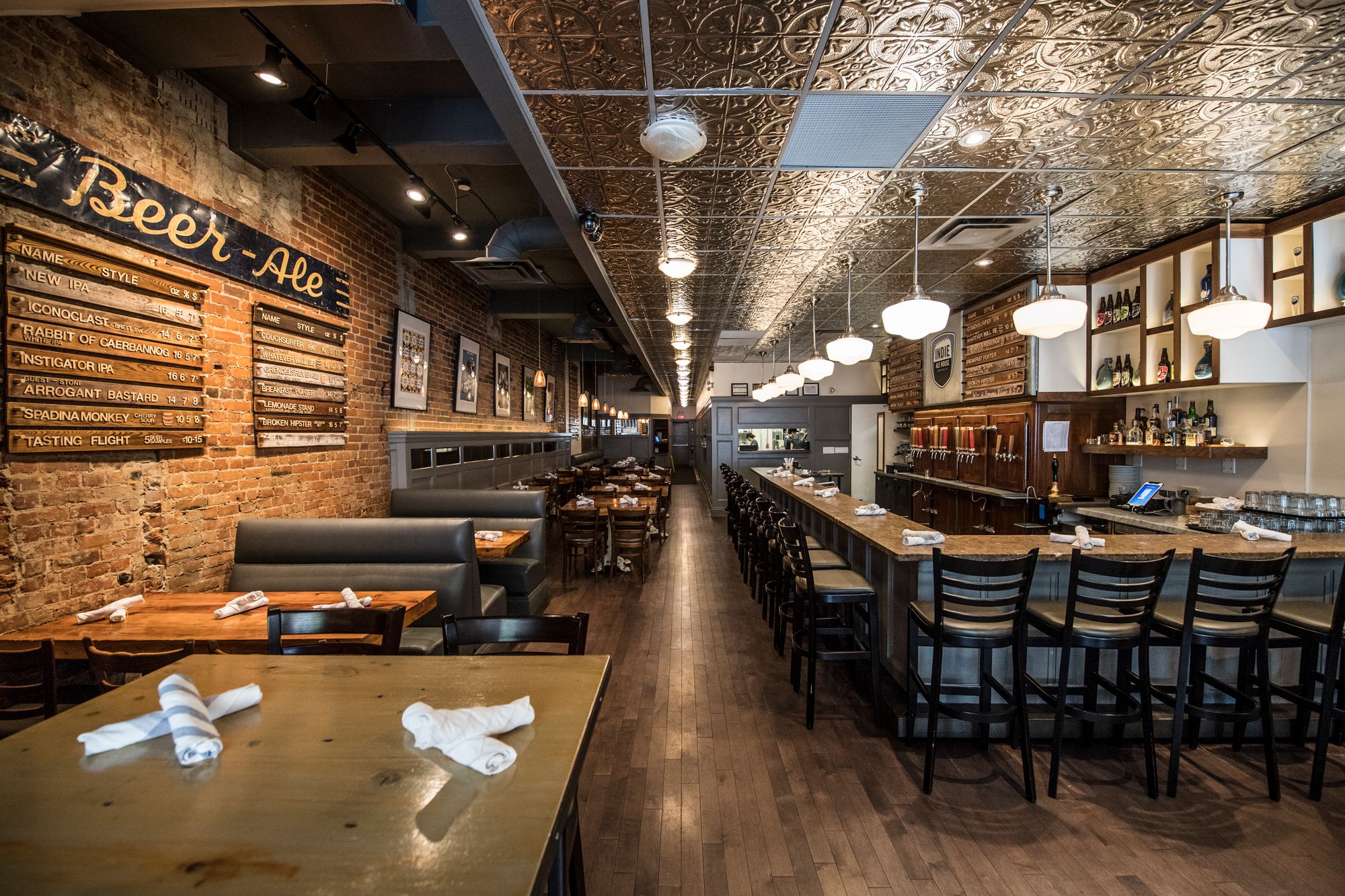Interested in starting your own entrepreneurial journey in food and beverage but unsure what to expect? Then read up on our interview with Jason Fisher, owner of Indie Alehouse, located in Toronto, ON, Canada.
What's your business, and who are your customers?
I am the owner-operator of the Indie Alehouse in Toronto, Canada. We started as a small brewpub in the west end of the city. When we opened in 2012, only 3 or 4 brewpubs were operating in the Province and less than a dozen breweries. Now almost ten years later, there are over 250 new breweries operating and more opening every day.
We put a huge emphasis on scratch-made food and making fun, flavorful ales like those you could find all over the US and Europe but were non-existent here. But mostly, we made beers we wanted to drink. We did not make beers on-trend or ‘what the market wanted’ but rather made what we would be proud of and fought to find people who wanted a better choice and options than they had at the time.
We have recently expanded with a new production facility and a partnership with Eataly at the Toronto locations. Despite many, many challenges, we are very happy with the results. We make award-winning food and beer, all on-site, with no shortcuts. We do things the hard way, and it pays off.

Tell us about yourself
Opening a brewery/brewpub is very hard. There are lots of shortcuts you can take, but I never wanted that (and never had much success in life going that way). For me, I was hooked on making beer the first made beer as part of my Gr 10 science fair submission. “The Life Cycle of Yeast.” When that first bottle opened and made the ‘fizz/pop’ sound, I was astonished. I also had a supply of beer as a 16 yrs old, so things were looking up.
I was a homebrewer for ages, getting lots of great feedback about my brewing, and even attended brewing school, but all as a side hobby. I had no real prospects of opening a brewery on my own, not being born into a brewing family, or being independently wealthy, which were the only paths I could see to owning a brewery at the time.
I worked at a high level in sales, marketing, and business analytics for two major global brands for over 15 years. I learned a lot, but it was not until I worked for three years at a very small tech start-up in a very fast-paced entrepreneurial company that I understood I could open a business on my own. I had also saved for decades. I was either going to buy a boat when I retired or do this, so when the opportunity came to exit the company and do something, I did.
Luckily for me, there was a thriving craft beer scene in the US with all kinds of world-class beer and brands and business models to use as examples to follow. I reached out to 30 breweries for advice; 28 of them got back to me on the same day I sent my email. Entrepreneurs are the best, and I wanted to be in the company of people like that.
What's your biggest accomplishment as a business owner?
My / our biggest accomplishment is always hiring great people and staying open, but in addition to that, we have another ‘big deal’ we achieved. When we were almost a year old, I asked two senior employees what we wanted to accomplish in the next 2-3 years. A huge goal that will take some effort to achieve. We all kicked around a couple of ideas, and each had our own goal. Win some prestigious brewing awards, get our beer into a music festival and my goal – bring an Eataly store to Toronto and be the brewing partner here.
I might as well have said we’re putting a brewery on Mars. I had about as much chance of achieving that at the time. I knew no one, had no connection, or remotely anywhere near the funds to do this. We would not have been anyone’s first choice to partner with. I had been to an Eataly, read all about them, and knew they we outstanding at what they did. They had partnered with a couple of the best breweries in the world to open the NYC flatiron location, and I wanted to be in that kind of company.
I did some research to find contacts and began emailing the company founder and his son, the new leader of the NYC stores and American expansion efforts. I got a very polite email back – “Ciao Jason, we have no plans to come to Canada, but thank you for the email” I was not deterred at all. I emailed quarterly, sent news clippings about Italian breweries, beer, Italian food, opportunities in Toronto, etc. If the Eataly team was at a wine festival or speaking someplace, I did my best to attend. Just to say hi. I did this for three years and finally got a meeting one Sunday afternoon when a bunch of Eataly execs came by unannounced. A project someplace had fallen through, and when considering other locations, someone said, ‘what about Toronto’, and the owner said – I know a guy in Toronto…
From that meeting, I got another meeting the next day where I was grilled for 6 hours on financials and projections. And then the following week. Then one day a week for a few months. After another year of meetings, they decided Toronto was a fit, a brewery was a fit for this location – but why us.? Why Indie? Why me? So, we had to prove ourselves a worthy partner and the choice for this location. We did and won the deal over bigger, better funded, better-rated online, older breweries. To this day, it is the best thing I have ever done, and I feel so fortunate to work with such an amazing company and people.
What's one of the hardest things that come with being a business owner?
The hardest thing is everything. Everything stops with you. Other employees, customers, suppliers, etc., can all have very reasonable excuses or rationale for things going the way they go, but in the end – it’s on you, and there is no place to hide.
In my experience, you have to be able to ‘own’ any issue that comes up even if, and especially if, you had no part in it going sideways. Equally as important, you have to be able to work on the very best thing you could be working on at that moment and quickly change if circumstances call for it.
What are the top tips you'd give to anyone looking to start, run and grow a business today?
We get a lot of prospective new brewery owners to come by and ask questions, and that's great. That is how I started, so I'm always happy to help.
One of the biggest red flags is when asked about a forecast or growth plan. If there is no answer or a top-down answer, I know there are going to be a lot of issues. If your forecast starts with – "we only need to get a small percent of this huge group," then you are in bad shape. If your pitch is beer is a multi-billion-dollar industry, and you only need .000002 % - you have no idea what you are doing. On the other hand, your forecast starts with 'we have 0 customers now and hope to grow to x in 90 days, Y in year one, etc.- you have a basis for testing and building on.
Two – I always ask, if this turns out to make half as much money as you forecast, if it is way harder and provides you with no fame or social media hype, if it's just hard work, would you be just as excited as you are now? Because if you think you are going to be rich and famous – you're not. At least this is not the business model for you.
Third – Everyone thinks they have a unique idea or concept. Usually, they don't. What anyone can have are hard work and (access to) capital. If you can't demonstrate that, I think you are done. There are many models out there to follow and occasionally tweak. Entrepreneurs are usually eager to share their stories and help.
Where can people find you and your business?
Website: https://indiealehouse.com/
Instagram: https://www.instagram.com/indiealehouse/
Twitter: https://twitter.com/indiealehouse
If you like what you've read here and have your own story as a solopreneur that you'd like to share, then email community@subkit.com; we'd love to feature your journey on these pages.
Feel inspired to start, run or grow your own subscription business? Check out subkit.com and learn how you can turn "one day" into day one.
